
By Kalvin Valdillez, Tulalip News
This past February, sixteen men and women took a chance on themselves and committed to a sixteen-week course at the Tulalip TERO Vocational Training Center (TVTC). Entering the game with little to no experience, those individuals showed up every morning for five days a week to soak up as much knowledge as they could about the booming construction industry. At TVTC, their slogan is ‘Training For A Better Tomorrow’, and that day officially arrived for those sixteen students on the afternoon of May 26.
A transformation took place at the space where the latest round of TVTC students learned numerous skills over the past few months in carpentry, cementing, plumbing, blueprint reading, and also in electrical and mechanical work. Tables were set up at the center of the TVTC building, and as soon as the clock struck 1:00 p.m., families and friends of each of the students began to pour in to show their support to their loved ones on their special day of recognition.
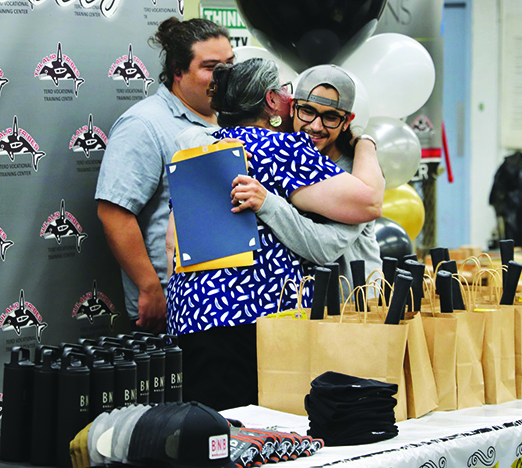
“This is an amazing program,” said Teri Gobin, Tulalip Chairwoman and former TERO Director. “You all have improved your skills in all of the different trades that are offered here to help you. This is a good step. You are making a big difference in your life, your family’s lives, and especially your children’s lives. You are setting the example for the next generation by being somebody they can look up to. I’m so proud that we have so many here today that are graduating.”
TVTC is a construction-focused course, and it’s the first of its kind. To date, TVTC remains the only Native American pre-apprenticeship program in the nation. The course is offered to tribal members enrolled in any of the 574 federally recognized tribes, as well as to their parents, spouses, and children. Throughout the years, TVTC has helped hundreds of Natives find their career path, some from as far away as Alaska and Wyoming. And that’s not to mention the countless homegrown students. Out of the sixteen graduates this quarter, eleven are enrolled Tulalip tribal members.
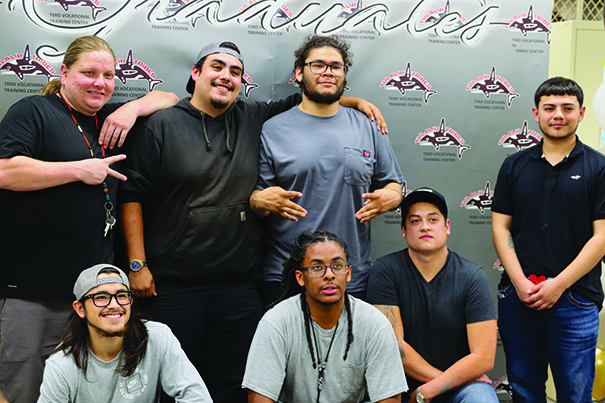
“We are accredited through LNI. And what that does is it gives our graduates direct entry into an apprenticeship, in whatever union that they choose to go into,” explained Jerad Eastman, TVTC Site Specialist. “So, it checks a box that gives them a step up, compared to anyone coming off the street, into a union. Some of the other things that we do here is we give them OSHA-10 training, we give them First Aid/CPR and AED training, they get certified in boom lift, forklift, scissor lift, and they also get HAZWOPER-40 hours, which is like asbestos abatement and working with hazardous materials. Those are all beneficial for anyone who’s looking to get into the trades.”
As soon as the students complete their 455 hours of coursework, they are introduced to a world full of opportunity with their newly acquired experience. According to the latest report by the U.S. Department of Labor, construction jobs are currently in high demand and are expected to grow exponentially over the next five years by an estimated 700,000 jobs.
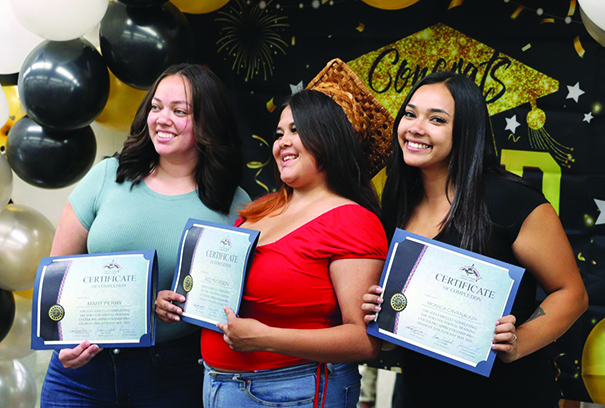
Many, if not all, of those available positions pay much more than the state’s minimum wage of $15.74. And a majority of those jobs are entry-level positions, so there is plenty of opportunity for TVTC students to make gains in both hands-on experience and financial health once they’ve completed their required apprenticeship hours.
“The Native way is to take care of your people because that’s what we do, we take care of each other,” said TVTC Family Career Navigator, Lisa Telford. “Construction wages are livable wages that you can support your family on. I’ve always been interested in helping Natives enter the construction industry, mainly because it is such a good wage.”
In addition to helping their graduates get their foot in the door of the construction industry, the TVTC staff actively makes an effort to offer continued support throughout the graduate’s newfound career journey. And due to spending several hundred hours together, each class forms a unique bond with each other and the instructors. Classmates often keep in touch with one another far beyond their TVTC experience, and some even enter the same field together.
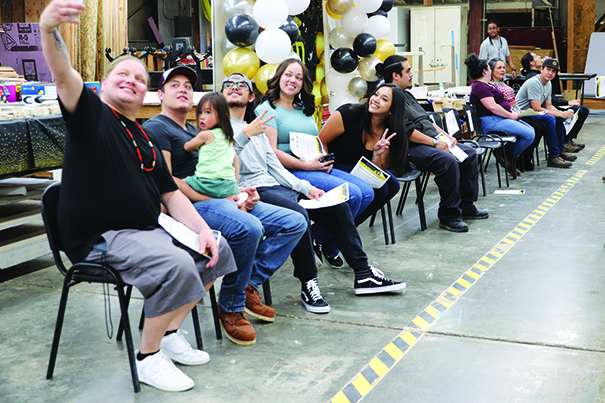
The comradery was on full display at this quarter’s graduation ceremony. During the celebration, the students sat together at the back end of the classroom and let out enormous whoops, cheers, and applause each time their classmates received their certificate of completion.
Said Jerad, “One of the things that we always talk about is that when you come to this program, you’re family. You gotta come back, and you gotta talk to future students. And another thing is that we’re always here to help you after this program. We’re always here to provide support, we’re always here to provide insight for them in whatever they need. At the end of the day, in the classes, we say ‘we leave together’, so we make sure no one’s leaving early. We all gotta leave together when everything’s done. We build a lot of groups here and we’re all one big family.”
After parting ways with their previous instructor at the end of the 2022 Fall quarter, Lisa, Jerad and TERO Client Services Coordinator Billy Burchett took on the instructor role for this group of students.
Prior to the start of the quarter, Lisa shared, “Billy, who is a sheet metal worker and was the teacher’s assistant, is now the Client Services Coordinator of this program. And Jerad worked for Quil Ceda Village as a Project Manager, he knows a lot about blueprint reading and construction. We’re all going to do it together. I know about carpentry, Jerad knows about blueprints, Billy knows about math, plumbing, and electrical. We’re going to put it all together to make one exceptional instructor.”
After taking on that challenge, the instructors enjoyed the fruits of their labor on graduation day and shared laughter, hugs, personable daps, and happy tears with their students as they came forward to accept their certificates and gift bags.
“To me, the graduation is not really the finale because no matter what, they belong to the TERO vocational training center,” Lisa expressed. “We’re always going to be supporting you and reaching out to you. We can work as an advocate, act as a liaison, whatever we have to do to make your transition into the construction industry smooth. Throughout the whole program, I have the opportunity to watch them grow and shine. My favorite part is when they realize that they enjoy what they are doing, you can hear their laughter and see the pride on their faces. I enjoy watching them grow into that person.”
The next TVTC course begins this September. Classes are held Monday through Friday from 8 a.m. to 3 p.m., with a few exceptions such as days when the class travels for a job site tour or when participants take part in a hands-on experience known as an ‘apprenticeship for a day’. Please feel free to reach out to Lisa at (360) 716-4760 for additional information and an application.
And hold up! Before you fold your copy of the syəcəb or exit the Tulalip News website, we put together a short Q&A with a select few of this quarter’s TVTC graduates. Check it out below!
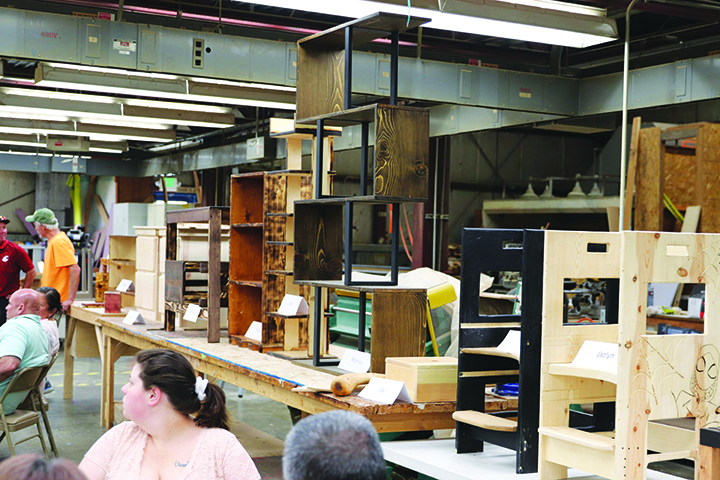
Tirja Greenwell, Tulalip Parent
Tulalip News: Can you tell us a little bit about yourself and how you got into the program?
Tirja: Yes, absolutely. I am a tribal parent, the grandmother to my children is Benita Rosen. She knew that I was really interested in working with my hands and building things. She actually turned me onto this program about year and half ago, but that was during COVID. I finally took it this quarter and it’s a super cool program.
Tulalip News: What were some of the skills you picked up through the course and what was your overall experience with TVTC?
Tirja: We had a crap-ton of hands-on experience, which was really cool and a lot of fun. We did personal projects, and I really grew through this program. I think one of the things that was most interesting was learning how to make blueprints.
Tulalip News: Now that you’ve completed the program, what’s next?
Tirja: I actually ended up leaving the program a couple of weeks before completion because I ended up getting a job at a small local plumbing company as a project manager. The program made a huge difference. Walking in there, and just having this this huge bag of knowledge, I was so confident, I was so prepared in that interview. After they hired me, they told me that I was one of the most impressive candidates they’ve ever seen. And I put my hands up to Lisa for that because I feel like she really harped on us to learn our strengths to help us succeed out in the real world.
Jazlyn Gibson, Tulalip tribal member
Tulalip News: Can you share how it feels to complete the TVTC course?
Jazlyn: It was a great accomplishment for myself and my fellow students. We all accomplished getting our diplomas on top of getting our certificates for construction.
Tulalip News: Can you describe your experience with the TERO program?
Jazlyn: It was a very hands-on experience. It was great to be here and to get know everybody. And we were the first to experience the program with three different teachers who weren’t used to being teachers. And also, as students we got to learn from each other because a lot of them had some prior experience. So that definitely helped us grow and do everything we needed to do to get through the program.
Tulalip News: Why do you believe this program is beneficial for tribal members and their families?
Jazlyn: It definitely helps get your foot in the door. You gain the necessary skills and have all these different possibilities that you can pursue so that you can get out there and be successful.
Tulalip News: Now that you completed the course, what do you plan to do next?
Jazlyn: Personally, I am looking to get into a sheet metal position or electrician. This definitely helped me figure out what I wanted to do as a career.
Erik Cruz, Colville Spouse
Tulalip News: You completed the course; how does this accomplishment feel?
Erik: It feels great! I’m not sure what I’m going to do next, but I’m definitely going into the construction field. This has been a really great traditional way to learn about the construction industry. Carpentry is my future.
Tulalip News: As a tribal spouse, why do you believe this program is beneficial to tribal members and their families?
Erik: Honestly, it’s something that people can get into early. And if young people can get into the trades early, they’ll be set for life. If you want to be rich, this is a great way to do so, it’s not the only way but it’s a good way to support yourself and your family.
Tulalip News: Do you have any advice for those interested in starting the course?
Erik: This is a pivotal program and it’s changed many people’s lives for the better. TERO is the GOAT!
Armando Vega, Tulalip tribal member
Tulalip News: What is the biggest thing you are going to take away from this TVTC experience?
Armando: All the experience and tools that I gained here – working with machinery, telehandler, boom lifts, scissor lift. And getting to know what goes together when building a tiny home, from the framing, roofing, flooring, the shingles, learning all of that was pretty cool. And also, taking in all the electrical work. They taught us about Ohm’s Law and how to wire three-way circuits. I was really good at that. They taught us about sheet metal workers and the air systems in buildings, and I was really interested in that. And I built a table here and it made me really like carpentry. It was nice to learn how to nail things with the nail gun and about what goes between wood, and how wood glue sticks good.
Tulalip News: Why do you think this program is beneficial for tribal members, other Natives, and their families?
Armando: It’s really beneficial because you learn new skills and learn more about yourself. It opens up everything – it opens your mind and opens all your options.
Tulalip News: Now that you completed the program, what’s next?
Armando: What’s next for me is going into a union. I got three applications that I’m finishing up. I’m going to apply for carpentry, electrician, and sheet metal worker. So, I’m doing whatever one gets back at me first.